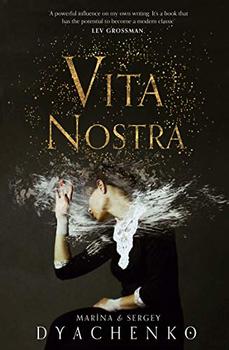Summary | Excerpt | Reviews | Beyond the Book | Read-Alikes | Genres & Themes | Author Bio

This article relates to Vita Nostra
The title of the novel Vita Nostra by Marina and Sergey Dyachenko comes from a verse in the Latin song popularly known as Gaudeamus Igitur ("So Let Us Rejoice"). The work's lyrics urge their audience to enjoy all the pleasure they can because all will end too soon, and they also praise the student lifestyle. Although most often considered jocular and sung with an air of joyful abandon, the lyrics can also be deemed fairly dark, a warning about the shortness of life.
Most Westerners would recognize the upbeat melody of this paean to academic life; it's been used in countless graduation ceremonies for decades, if not centuries. The tune has appeared as background music in many movies (such as the scene toward the end of the Wizard of Oz when the Wizard fulfills Dorothy's companions' desires – brain, heart, courage) and can be heard even in classical orchestral pieces such as the Berlioz Damnation of Faust and Brahms' Academic Festival Overture.
Some of the lyrics are very old; the second and third stanzas can be found in a Latin manuscript from 1287 CE and at the time were most likely the basis of a hymn of penitence. Around the 18th century it evolved into a student drinking song. The first known modern version was created by German composer Christian Wilhelm Kindleben (1748-1785) and appeared in his 1781 publication Studentlieder.
Many subsequent versions of Gaudeamus exist, with lyrics having been modified over time. In the United States, it is the first song in the earliest American college songbook – Songs of Yale, published in 1853. It was mentioned frequently in Yale publications, and it's thought that Yale's influence as an institution of higher learning led to the song's adoption by other schools. The Yale/Americanized rendering has two additional stanzas – numbers 8 and 9 – that don't appear in European versions.
Filed under Music and the Arts
![]() This "beyond the book article" relates to Vita Nostra. It originally ran in November 2018 and has been updated for the
September 2019 paperback edition.
Go to magazine.
This "beyond the book article" relates to Vita Nostra. It originally ran in November 2018 and has been updated for the
September 2019 paperback edition.
Go to magazine.
Your guide toexceptional books
BookBrowse seeks out and recommends the best in contemporary fiction and nonfiction—books that not only engage and entertain but also deepen our understanding of ourselves and the world around us.